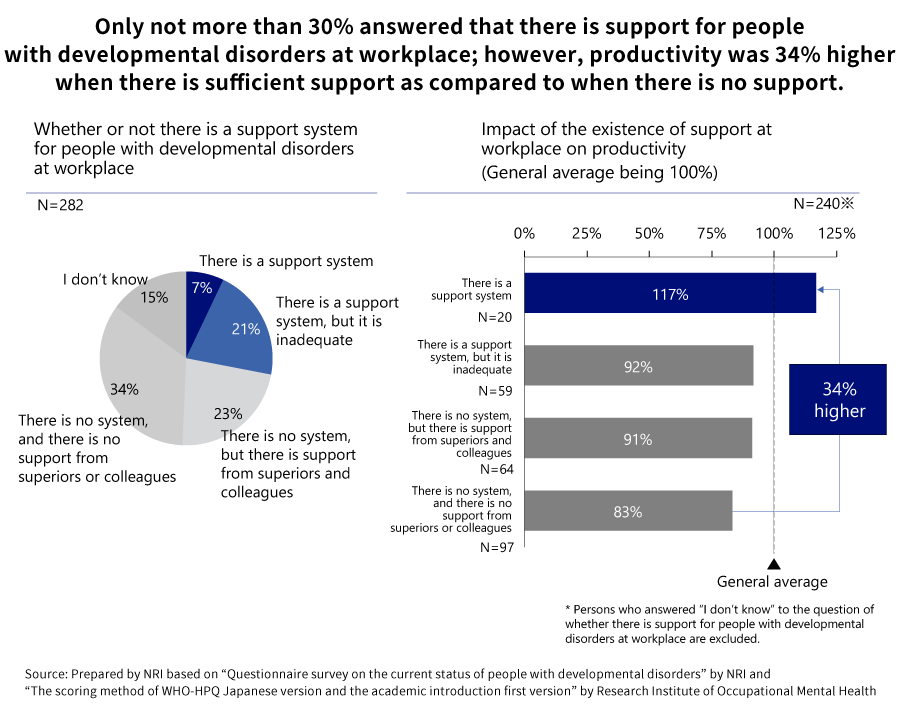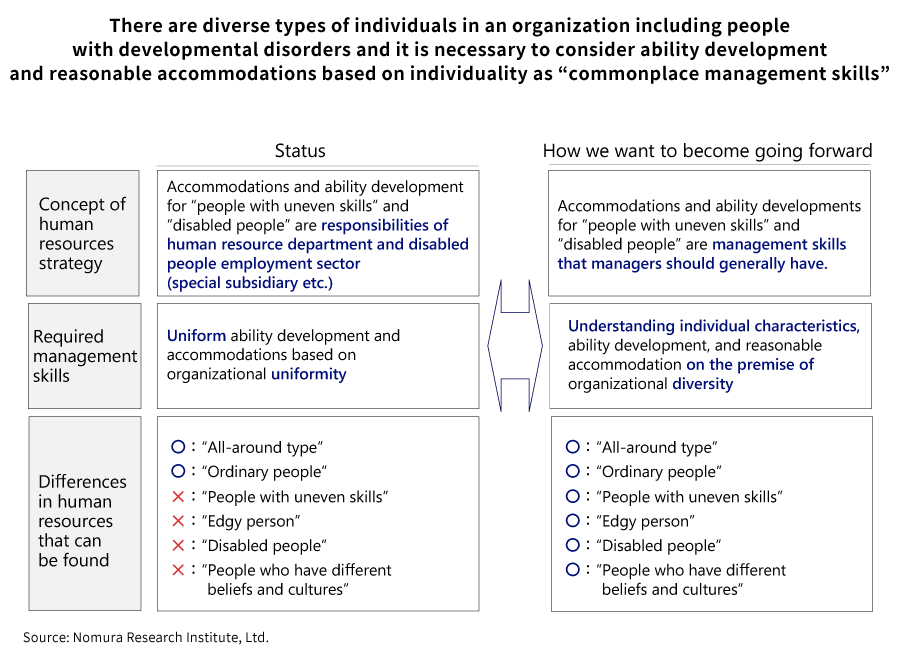
Furthering Opportunities for People with Developmental Disorders in a Digital Society, and the Economic Impact
Developmental disorders such as autism spectrum disorder (ASD), attention deficit/hyperactivity disorder, and learning disorders are called “invisible disorders” because they show few physical signs. Each year, more and more people are diagnosed with developmental disorders in Japan, and there is a possibility that the inability to provide opportunities for them will cause economic losses to spread. We asked members of NRI who conducted a study on people with developmental disorders about the current state and the potential of opportunities for them.
Personnel with development disorders are active as specialists in large overseas companies
In large overseas companies, people with developmental disorders are being actively hired and nurtured as advanced IT professionals with a focus on their special characteristics and talents. For example, large companies in the IT industry such as SAP, Hewlett Packard Enterprise (SPE), Microsoft and IBM have established programs for employing persons with autism and are appointing persons with autism as software engineers and other advanced IT positions.
Further, there is an entity named “Specialisterne” that assists large companies in hiring people with developmental disorders. In addition to employing people with autism as testers to verify whether software operates correctly, the company also provides many companies with autistic personnel hiring programs that it independently developed for recruitment purposes.
SAP has its own program called “Autism at Work”, and a person hired through this program developed an innovative application and won SAP’s Founders’ Award. This award was given only four years after the person was recruited by SAP. It became known throughout SAP that the developer of the application was a person who was recruited through the autism program, which facilitated understanding of autistic employees of the company. Similarly, to the award, it can be said there is great value in the fact that opportunities for people with developmental disorders were created in the form of a hiring program.
The employment of people with autism is not limited to the IT industry. For example, U.S. financial conglomerate JP Morgan Chase & Company employs people with autism as business analysts and personal bankers. Further, companies such as The Goldman Sachs Group, Inc., Ford Motor Company, Caterpillar, and Dell have launched internship and pilot programs for people with developmental disorders that are designed to lead to full-time positions.
The estimated economic loss amount in Japan due to lack of support for people with developmental disorders is approximately 2.3 trillion yen
If people who may have developmental disorders but have not been diagnosed are included, the economic loss could increase by 2.5 times
NRI conducted a study of persons with developmental disorders who have been diagnosed with ASD or ADHD
1
.
NRI estimates that Japan’s economic loss related to developmental disorders amounts to approximately 2.3 trillion yen, of which 1.3 trillion yen is related to ASD and 1.0 trillion yen is related to ADHD. Economic loss in such a case is the sum total of direct expenses such as medical costs and social services costs, and indirect expenses such as loss from low income and loss due to non-employment (labor-related economic loss).
Of the overall responses to our question on whether there is any workplace support system related to developmental disorders, only 7% answered that “there is a support system” and 21% answered that “there is a support system, but it is inadequate”, meaning that less than 30% answered in the affirmative.
Further, 23% answered “there is no system, but there is support from superiors and colleagues”, and 34% answered “there is no system, and there is no support from superiors or colleagues”.
With respect to productivity, it was found that productively was 117% higher than the general average if “there is a support system”, and productivity was 83% lower than the general average if “there is no system, and there is no support from superiors or colleagues”.
Moreover, we learned that at least a majority of persons diagnosed with developmental disorders are reluctant to convey the fact that they have developmental disorders for reasons such as lack of understanding and prejudice. The study showed that the number of persons who may have ADHD but have not been diagnosed is roughly 2.5 times that of the number of persons diagnosed with ADHD, and that the amount we estimated this time may only be a portion of the economic loss related to developmental disorders.

Advanced cases of creating opportunities for people with developmental disorders in Japan
There are also corporations in Japan that, regardless of the framework for employment of disabled people so far, are creating opportunities for people with developmental disorders.
Digital Hearts, which performs a variety of IT tools quality tests, has been actively hiring people who have experienced social withdrawal (hikikomori) by creating opportunities to become active as game debuggers
2
and ethical hackers
3
, which are specialists in the IT field.
When Digital Hearts received an order from Microsoft for the debugging of the Xbox 360, the quality of the work received a lot of attention. Subsequently, in a bug detection showdown between Digital Hearts engineers and Microsoft engineers, Digital Hearts was victorious. Apparently, an astonished Bill Gates even invited Digital Hearts staff to Microsoft headquarters.
There are also companies like Specialisterne in Japan that support the employment of people with developmental disorders by corporations. Personal Challenge is developing “Neuro Dive”, an IT specialized work transition support that nurtures people with developmental disorders as advanced IT personnel, ascertains the strengths of individuals using custom tools, nurtures IT personnel by methods that match the individuals, and helps them find jobs.
What changes are necessary in Japan for people with developmental disorders to become active?
As a result of the decreasing birthrate and aging of the population, and changes to industrial structures, the securing of industrial personnel is imperative. One possible resolution of this issue is for people with developmental disorders to become more active. Doing so makes it necessary to utilize, in the general employment sector, the reasonable accommodation know-how cultivated through a framework for employing people with disabilities, so that people with developmental disorders and others in the general employment sector have more opportunities to become active.
It is also important not to seek universality in the general employment sector but to create opportunities where an individual’s talents can be demonstrated to the utmost in specific occupations. To expand opportunities for these persons to enter occupations as specialists and advanced specialists, it is necessary to understand that there are diverse types of individuals in a workplace, including people with developmental disorders, and to consider ability development and reasonable accommodations based on individuality as “commonplace management skills”. To realize that, it can be said that in addition to the qualities and efforts of individual employees to demonstrate an individual’s talent, it is necessary to change the form or personnel management based on an understanding that the surrounding environment has significant impact on an individual’s performance.

- 1 The study was conducted over three days, from February 24, 2021 to February 26, 2021. The study was conducted in two stages: first, a screening survey of approximately 110,000 men and women of 18 to 65 years of age excluding students was conducted, and then a detailed examination of people who voluntarily answered as having been diagnosed as having ASD (333) or ADHD (335) was conducted.
- 2 Game debugger: A person whose job is to detect bugs by playing game software.
- 3 Ethical hacker: An engineer with a high sense of ethics and morals who prevents attacks by hackers with malicious intent.
Profile
-
Healthcare Services Consulting Division
-
Group Manager Kuniaki Wakabayashi
-
Atsushi Takada
-
Takuya Matsumoto
-
Miki Yasuhara
-
Yurika Kijima
* Organization names and job titles may differ from the current version.